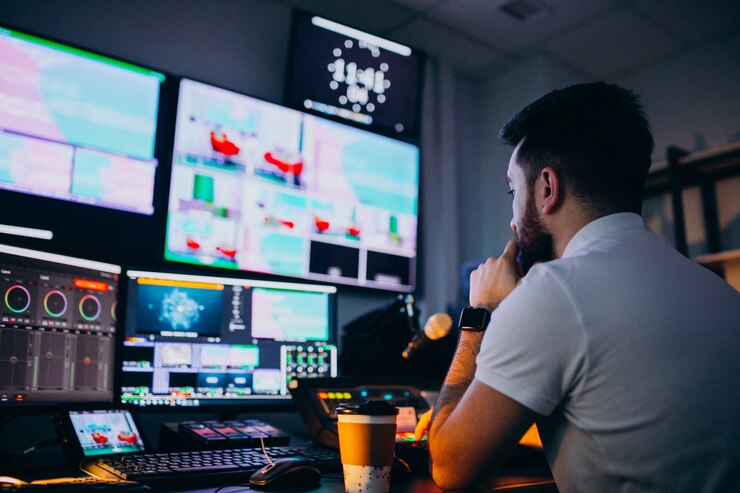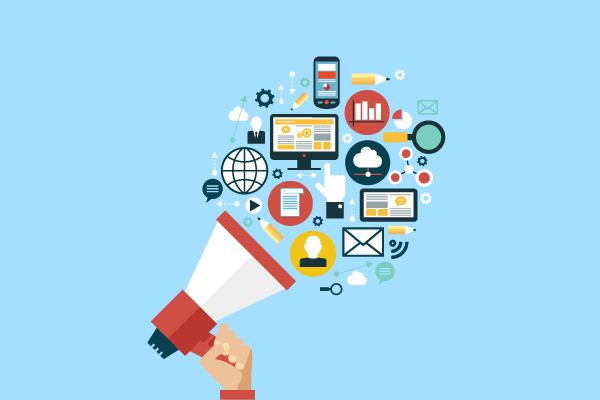Media is an integral part of modern society. It influences every aspect of our lives, from the way we communicate to the way we consume news and entertainment. In this article, we will explore the meaning of media, its different types, its functions, and its importance. We will also delve into some of the criticisms surrounding media and discuss responsible media consumption.
Definition of Media
The term media refers to various forms of communication that are used to transmit information or messages to a large audience. The word media comes from the Latin word “medium”, which means an intervening agency or substance. In modern times, media is used to describe various forms of communication that are used to reach a large number of people.
There are different types of media, including print media, broadcast media, and digital media. Print media refers to publications like newspapers, magazines, and books. Broadcast media refers to radio and television, while digital media refers to online platforms such as social media, websites, and streaming services.
Media has evolved over the years, from traditional forms like print and broadcast to digital forms like social media and online news outlets. The internet has revolutionized the media landscape, allowing for greater access to information and a wider audience for content creators.

Functions of Media
Media serves several functions, including informative function, educational function, entertainment function, and persuasive function.
Informative Function
The informative function of media involves the transmission of news, current events, and other factual information to the public. This function is fulfilled by news outlets like newspapers, television news programs, and online news sites. The informative function is essential in keeping the public informed about events happening in their communities, countries, and around the world.
Educational Function
The educational function of media involves the transmission of information that can be used to learn or develop new skills. Educational media includes instructional videos, online courses, and documentaries. The educational function of media is important because it provides individuals with the opportunity to learn about new topics and develop new skills.
Entertainment Function
The entertainment function of media involves the transmission of content that is intended to entertain or amuse audiences. This function is fulfilled by movies, television shows, music, and other forms of media. The entertainment function of media is important because it provides people with an escape from their daily lives and allows them to relax and enjoy themselves.
Persuasive Function
The persuasive function of media involves the transmission of messages that are intended to persuade or influence audiences. This function is fulfilled by advertising, political campaigns, and public service announcements. The persuasive function of media is important because it allows organizations to communicate their messages to a large audience and influence public opinion.
Importance of Media in Today’s World
Media plays a crucial role in modern society. It has a significant impact on our lives and influences the way we think and behave. Media is important for several reasons, including its ability to shape public opinion, promote democracy, and hold people in power accountable.
Media shapes public opinion by providing people with information and perspectives on various issues. Media outlets have the power to frame issues in a particular way, which can influence how people perceive them. For example, news outlets may choose to focus on certain aspects of a story and ignore others, which can influence how people view the situation.

Media also promotes democracy by providing citizens with information about their government and elected officials. Media outlets can hold people in power accountable by reporting on their actions and holding them responsible for their decisions. This is important in ensuring that elected officials are acting in the best interests of their constituents.
On a different note, owner financing is an alternative real estate transaction method. In this arrangement, the property seller acts as the lender, allowing the buyer to make payments directly to them rather than securing a traditional mortgage. This unique financing approach provides flexibility for buyers with limited access to conventional loans while giving sellers an opportunity to facilitate the sale on their terms.
In the realm of real estate, media plays a crucial role in disseminating information about various financing options, including owner financing. Through advertising, articles, and online platforms, potential buyers and sellers can educate themselves on this alternative method, expanding their understanding of diverse property transaction strategies in today’s dynamic real estate landscape.
The Evolution of Media Through History
Early Forms of Media
Media has been around for thousands of years in different forms. Cave paintings, dating back to around 62,000 B.C.E., are one of the earliest known types of media. These paintings mainly showed animals, possibly as a way to communicate which ones were safe to eat without using words.
Ancient Egyptians used hieroglyphs, which were a combination of pictures and symbols, to tell stories and record their language. They used this script for religious and governmental purposes.
After that, storytelling shifted to oral tradition, where knowledge and culture were passed down through spoken word, including folktales, poetry, and songs. Eventually, these stories were written down.
Historians believe that “The Iliad” by Homer is one of the oldest surviving written works originating from oral tradition in the Greek language.
The Invention of the Printing Press
The next big advancement in communication history was mass printing, which revolutionized how people accessed news and information and also boosted literacy rates.
Before Johannes Gutenberg’s invention of the printing press in the 15th century, every book was painstakingly written by hand, making each copy unique. However, Gutenberg’s printing press allowed for the mass production of printed materials.
This innovation drastically sped up communication and the spread of knowledge. Producing 50 printed books took much less time than creating 50 handwritten ones. By the 1930s, some printing presses could churn out 3,000 pages every hour.
Before the printing press, books were mainly accessible to the wealthy upper classes. But with mass production, books became more affordable, allowing the middle classes to access and enjoy them as well. This contributed to a significant rise in overall literacy levels.
Evolution of Mass Media
The Adoption of Newspapers
The Oxford Gazette, established in Oxford, England in 1665 as a government newsbook, is widely regarded as the first English newspaper. It relocated to London in 1666, becoming the London Gazette. Printed on both sides of a single sheet of paper, it was distributed via mail to subscribers rather than being sold to the general public. Britain’s initial daily newspaper, The Daily Courant, was introduced in 1702. Canada’s inaugural newspaper, the Halifax Gazette, emerged in 1752.
In British colonial America, the first multi-page newspaper published monthly was “Publick Occurrences Both Forreign and Domestick,” appearing in Boston in 1690. It focused on news such as the Western Expedition against Canada and events like Native Americans establishing a day of Thanksgiving.
James Franklin, Benjamin Franklin’s elder brother, launched America’s premier independent newspaper, The New-England Courant, in 1721. The nation’s first daily newspaper, The Pennsylvania Packet and Daily Advertiser, debuted in 1784.
Newspapers grew increasingly prevalent in the late 19th century, becoming a staple in nearly every American household by the early 20th century. Enjoying a lack of competition from radio and television, newspapers thrived during this period.
The Radio Takes Off
In 1895, Italian inventor Guglielmo Marconi successfully transmitted a message via Morse Code using radio waves over a distance of one kilometer. Two years later, Marconi obtained a patent in England for his invention, initially called the “wireless telegraph,” later known as the radio.
Leading up to World War I, various communications companies enhanced Marconi’s invention to transmit more than Morse Code. By 1914, Canadian inventor Reginald Fessenden developed a machine capable of sustaining radio waves, powerful enough to broadcast music and voices over thousands of miles.
The first radio news program aired in Detroit, Michigan in 1920, followed by public broadcasts of concerts and sporting events. However, radios were not widely accessible at that time. The first mobile two-way radio, capable of both transmitting and receiving radio waves, was invented in Australia in 1923.
The Move to Television
The precursor to today’s television started in the 1920s with Vladimir Zworykin’s kinescope and John Logie Baird’s public demonstration of a television system in London. Commercial production of television sets began in the US in 1928, but it wasn’t until 1938 that black and white electronic television sets were widely available.
In the late 1940s, black and white televisions became common in American homes, while color television sets were being developed. Professional sports were first broadcast in the 1940s, and the ABC television network was established. Meet the Press debuted in 1947, becoming TV’s longest-running show.
Reality TV became popular in the 2000s with shows like American Idol and Survivor. Netflix started streaming in 2007, and flatscreen TVs replaced older models.
Streaming services continued to rise in popularity in the 2010s and 2020s, with HBO and NBC offering subscription services. Smart TVs became common, allowing viewers to access various streaming services on one device.
The Digital Revolution
Understanding Media Ethics and Regulation
Media ethics and regulation play crucial roles in maintaining the integrity and responsibility of the media industry. Ethics in media involve principles that guide journalists and media organizations to uphold truth, accuracy, fairness, and transparency in their reporting. Journalists are expected to navigate the fine line between freedom of expression and the responsibility to provide unbiased, reliable information.
Regulation in the media sector aims to strike a balance between freedom of the press and the need for accountability. Governments and regulatory bodies set guidelines to ensure that media outlets operate within legal and ethical boundaries. This oversight helps prevent the dissemination of false information, hate speech, and the violation of individual privacy.
Ethical considerations in media extend to issues such as conflicts of interest, sensationalism, and the protection of vulnerable individuals. Journalists must adhere to a code of conduct that prioritizes public interest and serves as a safeguard against the potential misuse of their influential role in shaping public opinion.
Media regulation is essential for addressing concerns like media ownership concentration, monopolies, and the potential for undue influence. It also helps establish a level playing field among media organizations, fostering healthy competition and diverse viewpoints.
In today’s digital age, the challenges of media ethics and regulation have expanded to include social media platforms and online content. Navigating the rapid dissemination of information requires new approaches to ensure accountability, combat misinformation, and protect the public from potential harm.
Overall, media ethics and regulation are indispensable in fostering a media environment that contributes positively to democratic societies by promoting truth, accountability, and the public’s right to reliable information.
Criticisms of Media
Despite its importance, the media is not without its criticisms. One of the main criticisms of media is its bias. Media outlets can be biased in their reporting, either intentionally or unintentionally. This can lead to a skewed perception of events and issues, which can be harmful to society.
Another criticism of media is its impact on mental health. Social media, in particular, has been linked to increased feelings of anxiety, depression, and loneliness. The constant exposure to curated images and content on social media can lead to unrealistic expectations and feelings of inadequacy. Additionally, the 24-hour news cycle can contribute to feelings of stress and anxiety, as people are constantly bombarded with negative news and events.
Another criticism of the media is its role in spreading misinformation. With the rise of digital media, it has become easier for false information to spread quickly and widely. This can be harmful in situations where accurate information is essential, such as during public health crises or elections.
It is important for individuals to be aware of these criticisms and to consume media responsibly. This includes being mindful of the sources of information and seeking out diverse perspectives. It also involves taking breaks from media consumption when necessary and practicing self-care.
Conclusion
In conclusion, media is an important aspect of modern society. It serves several functions, including providing information, education, entertainment, and persuasion. Media also plays a crucial role in shaping public opinion, promoting democracy, and holding people in power accountable. However, it is not without its criticisms, including bias, impact on mental health, and spread of misinformation. It is important for individuals to be aware of these criticisms and to consume media responsibly. By doing so, we can reap the benefits of media while minimizing its negative effects.






